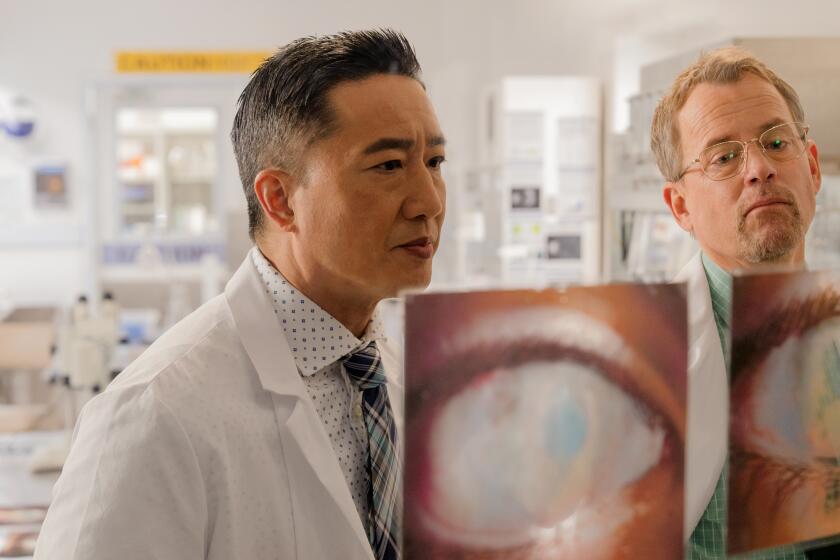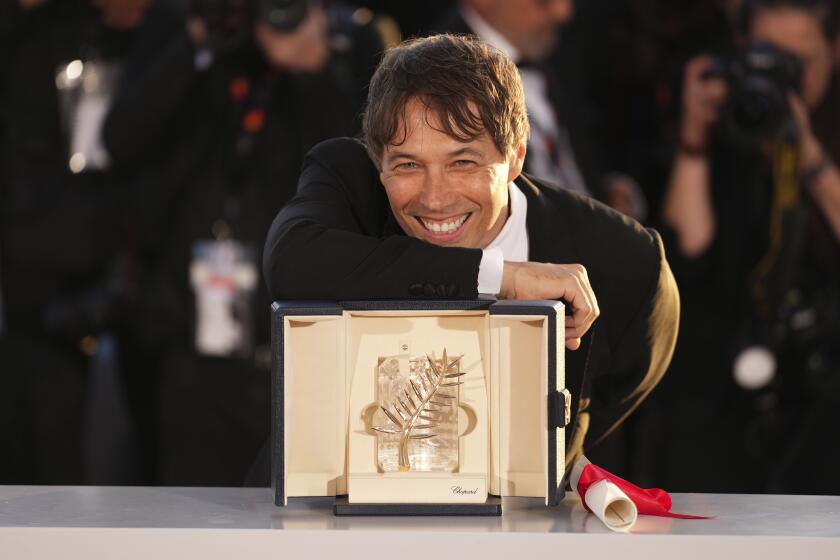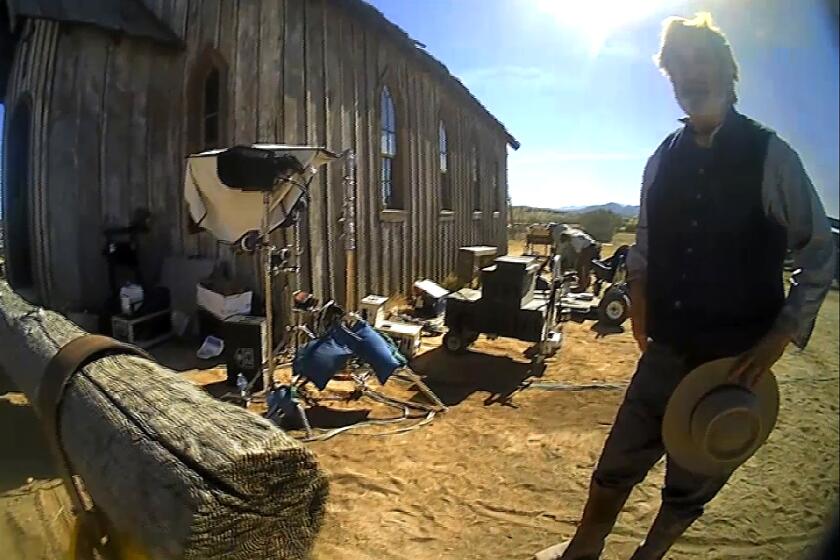MOVIE REVIEW : Apartheid Tears at Family Life in ‘World Apart’
“All this hand-wringing, playing Joan of Arc, is an excuse for being a terrible mother,” a South African police interrogator says witheringly to journalist Diana Roth in “A World Apart” (Beverly Center, AMC Century 14), a haunting, deeply moving film of conscience and consequence.
Roth (Barbara Hershey) is, in 1963, the first white woman to be jailed under the South African government’s Ninety Days Detention Act, the period for which prisoners could be held without charges. And of all her interrogator’s accusations, this is the one to which she feels most vulnerable: the effect of her detention on her three young children.
Told with an empathy that is strengthened by director Chris Menges’ refusal to sentimentalize his characters, “A World Apart” is really about two separated worlds, one huge, one intimately small: black Africa and Diana Roth’s all-female household.
Diana and Gus Roth are the names that screenwriter Shawn Slovo has given her parents, Ruth First and Joe Slovo, in this autobiographical film.
Ruth First was a journalist, writing for a series of anti-apartheid newspapers; her husband was a member of the banned South African Communist Party and one of the key figures in the also-banned African National Congress.
At the time her mother was arrested by South African government forces, Shawn Slovo was 13, eldest of three sisters. (She’s called Molly in the film, and played by an uncannily fine newcomer, Jodhi May.) Earlier that year, their father (Jeroen Krabbe) left under cover of night to avoid the same fate as fellow ANC members Nelson Mandela and Walter Sisulu: arrest and life sentences.
We see Diana Roth in the film’s opening as Molly might, in glimpses and bits, moving briskly through her cramped newspaper office in downtown Johannesburg. She is shut off behind dark glasses, not unloving but busy and distracted, her mind skimming a dozen things at once. Rightly or wrongly, Roth has tried to protect her daughter by not bringing her into details of her parents’ political life, other than by giving Molly a broad spectrum of grown-up friends, black and white. They include Harold (Tim Roth), her mother’s co-worker at the paper, who turns out to have tensile strength behind a deceptive facade.
From a brief predawn scene Molly stumbles onto between her mother and departing father, it’s plain that the two have an intense bond, physical as well as political. (In a rare bit of confidence in an audience, the film makers convince us of a couple’s deepest commitment without sexual explicitness. Astonishing.) It’s a sight, however, guaranteed to intensify Molly’s own sense of apartness, of secret worlds about which she has been told nothing.
To Molly, feeling all the isolation and confusions of adolescence, Diana is a mother to admire but not to cuddle up with. That she gets from Elsie (Linda Mvusi), the Roths’ calm, loving black housekeeper, whose own young children are dusty miles away in a tin-roofed township village. Actually, Elsie and her younger brother, Solomon (Albee Lesotho, exceptionally good), a charismatic leader of the ANC’s military arm, are the warmest forces in Molly’s life.
After her mother’s arrest, when Molly is systematically shunned by her classmates, when her grandmother breaks down and even Elsie must go away, every landmark of Molly’s familiar world seems obliterated. The irony is that mother and daughter are in virtually parallel isolation--but to a teen-ager, her mother is exercising her choice to leave her family. Adolescence never was the most generous of periods.
Although the nuts and bolts of Roth’s detention--the cold confining cell, its electric light burning endlessly--seem less horrifying than her own description of them in her book “117 Days,” her relentless questionings are close enough to the real thing to break anyone’s spirit. Roth’s method of keeping herself together is by stoicism and, finally, a hunger strike, during which the actress herself seems to almost fade away.
Daring to have a central figure this controlled is a risky choice for the film makers; Roth’s anguish and worry about her compatriots and her children are kept under such tight rein. In the end, it works to the film’s advantage. After Richard Attenborough’s mistakes of “Cry Freedom,” Menges has been careful to set his film’s tone differently--to keep it controlled, real, to give it more the feeling of a documentary than a movie epic.
He has done the same with his glowing trio of actresses. Hershey’s own warmth spills over to Roth; she lets us at least imagine that Roth’s coolness is a desperate effort to keep on top of the situation. Hershey makes us want to like an admittedly difficult woman (although it’s too bad Slovo, who has called her mother “extremely warm and humorous,” didn’t give that side equal time).
Young May is a brilliant find, sweet-shy, translucently true. And to understand just how good cinematographer Menges is in his first shot at directing, you need only learn that Mvusi, responsible for the film’s most anguishing moments, is not an actress but a Zimbabwean architect, chosen for her “intelligence and political awareness.” (Hershey, May and Mvusi shared the best-actress award at this year’s Cannes Film Festival.)
Molly’s gradual realization of the inequities of the real world comes with the shock that it must have had for Slovo herself. Our consolation comes in watching Jodhi May make this transition, stretching and maturing, literally under our eyes. And in the film’s climactic scene, when her skinny little arm shoots up during the singing of the stirring ANC anthem “Nkose Sikolele,” it becomes a transcendent moment of joy and understanding.
‘A WORLD APART’
An Atlantic Entertainment Group and British Screen presentation of A Working Title production. Producer Sarah Radclyffe. Executive producers Tim Bevan, Graham Bradstreet. Director Chris Menges. Writer Shawn Slovo. Camera Peter Biziou. Designer Brian Morris. Music Hans Zimmer. Editor Nicolas Gaster. Costumes Nic Ede. Sound Judy Freeman. Dialect director Nora Dunfee. Associate producer Slovo. With Barbara Hershey, Jodhi May, David Suchet, Linda Mvusi, Jeroen Krabbe, Albee Lesotho, Yvonne Bryceland, Kate Fitzpatrick, Nadine Chalmers.
Running time: 1 hour, 52 minutes.
MPAA-rated: PG (parental guidance suggested).
More to Read
Only good movies
Get the Indie Focus newsletter, Mark Olsen's weekly guide to the world of cinema.
You may occasionally receive promotional content from the Los Angeles Times.






